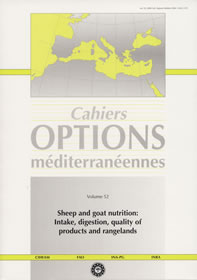| Article précédent | p. 107-110 | Article suivant |
Effect of dietary CSFA and heat treatment of milk on sensory profiles of sheep and goat cheeses during ripening
The possible effect of dietary calcium salts of long chain fatty acids (CSFA) and heat treatment of milk on flavour and texture properties of sheep Pecorino and goat cheese was assessed in two trials. Both cheese types were manufactured with two cheesemaking techniques: from raw milk and from heat-treated milk followed by addition of autochthonous lactic cultures. Within each cheesemaking treatment, animals were fed two different diets: (i) a control diet, based on mixed pasture and commercial concentrate; and (ii) the same diet as (i) but supplemented with calcium salts of long chain fatty acids. Pecorino cheese (at 1 and 6 months of ripening) and goat cheese (40 days of ripening) were sensory profiled by employing a trained sensory panel. Results were evaluated by Anova and Generalised Procrustes Analysis. In both experiments, the cheesemaking technique strongly affected the aspect, texture and a number of key flavour properties of cheeses.
- [ Afficher ]
- [ Télécharger ]
- [ Exporter la citation ]
Vous pouvez télécharger la citation au format :
- [ Imprimer ]
-
Mots-clés
EVALUATION SENSORIELLE, FABRICATION FROMAGERE, FROMAGE DE CHEVRE, LIPIDECiter cet article
Sinesio F., Moneta E., Nardo N., Sabato R. Effect of dietary CSFA and heat treatment of milk on sensory profiles of sheep and goat cheeses during ripening. In : Ledin I. (ed.), Morand-Fehr P. (ed.). Sheep and goat nutrition: Intake, digestion, quality of products and rangelands. Zaragoza : CIHEAM, 2000. p. 107-110. (Cahiers Options Méditerranéennes; n. 52). 8. Seminar of the Sub-Network on Nutrition of the FAO-CIHEAM Inter-Regional Cooperative Research and Development Network on Sheep and Goats, 1998/09/03-05, Grignon (France). http://om.ciheam.org/om/pdf/c52/00600318.pdf



